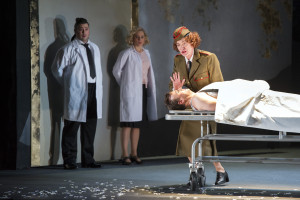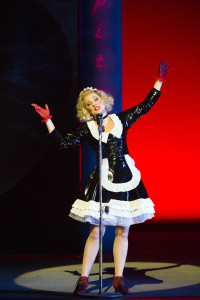Beaumarchais, the creator of Figaro, wrote three plays about his creation. The first two, The Barber of Seville and The Marriage of Figaro (also being performed this season by WNO) were set respectively by Rossini and Mozart. The third, The Guilty Mother, which takes place in France rather than Seville, and during the French Revolution, has also been set by various composers, the best-known being Darius Milhaud, who wrote his version in 1966. It would be possible to stage a Figaro trilogy with these three operas, but WNO has chosen to commission a new opera, loosely based on Beaumarchais’s third play, and with a libretto by the company’s own artistic director, David Pountney, an experienced librettist in his own right, and with music by the Russian-born but London-based composer Elena Langer.
Pountney gets around one problem with Beaumarchais’s Guilty Mother: the enemy of the Count and Figaro is one Major Bégearss, an Irish adventurer who has previously served the Count, but whose surname is altogether unspeakable, not to say unsingable in English. Sung by tenor Alan Oke with sinister relish, he is now referred to only as the Major, but he remains the most striking figure on stage.
Marie Arnet and Andrew Watts
Rhian Lois and Naomi O’Connell
Mark Stone and Elizabeth Watts
The action opens with the Almaviva family fleeing into exile, some fifteen years after the supposed date of The Marriage of Figaro. The revolution has caught up with them, and dispossessed them of their castle and their wealth, and they are at the mercy of the sinister Major, who agrees to provide Count Almaviva with enough to fuel his gambling urge and to provide for his immediate family, but not enough to keep on his retinue of servants that still includes Figaro (David Stout, who also plays Mozart’s Figaro this season) and his wife Susanna (Marie Arnet). Figaro loses no time in going back to his original profession of barber, setting up a natty salon (one of Ralph Koltai’s beautifully efficient and effective sets, all based on a pair of revolving panels with the minimum of textural and sculptural detail) where he finds himself short of clients.
David Stout, Marie Arnet, Alan Oke and Andrew Watts
Pountney follows Beaumarchais in making the central motor of the plot the confusion caused by two illegitimate births, one of Serafin (a breeches role sung by Naomi O’Connell) and his beloved Angelika (Rhian Lois in lucid, focussed voice). Serafin is supposedly the son of Count and Countess Almaviva, and Angelika is the Count’s ward. The Major passes a forged letter to Almaviva, telling him that Cherubino (a page at the castle) was the father of Serafin, and that he was subsequently killed in action. Almaviva is forced to agree to let the Major marry Angelika in return for continuing to support him and his family.
Susanna leaves Figaro when he refuses to have a child with her, and goes for refuge to a louche nightclub run by the plump, camp Cherub (counter-tenor Andrew Watts) who, in spite of having now reached his thirties, still has an unbroken voice. They conclude the first act with a saucy, wistful duet sung cabaret-style. The second act resolves the dilemmas, and returns the Almavivas to a sort of safety, with an ingenuity of plotting that it would be quite wrong to spoil in a review.
Justin Brown conducts Langer’s score with a confidence that makes the piece sound as if it has already been a standard work in the repertory for quite some time. Pountney’s production is as efficient and effective as Koltai’s sets, which is saying a lot.
Marie Arnet
Elizabeth Watts and Naomi O’Connell
Although the cabaret number and the occasional flashes of tango and other dance rhythms stand out, Langer’s score as a whole is lyrical, sensuous and beautifully crafted, with tuned and untuned percussion, luxuriant lower woodwind, clashing brass and velvety horns, all making up a score that, if it has a Russian influence, is more Prokofiev than Shostakovich, but which allows the wholly singable lines of Pountney’s crafty libretto to project clearly across the often dense orchestral textures. There are musical and verbal puns (Figaro’s salon has ‘fringe benefits’) and a final clever reference, on piano, to Mozart, creator of the greatest Figaro of them all. A fascinating, musically beguiling and dramatically satisfying evening. This opera deserves to travel far and wide.
Photography: Richard Hubert Smith
WMC, Cardiff Feb 27, Venue Cymru Llandudno March 10 and touring England






